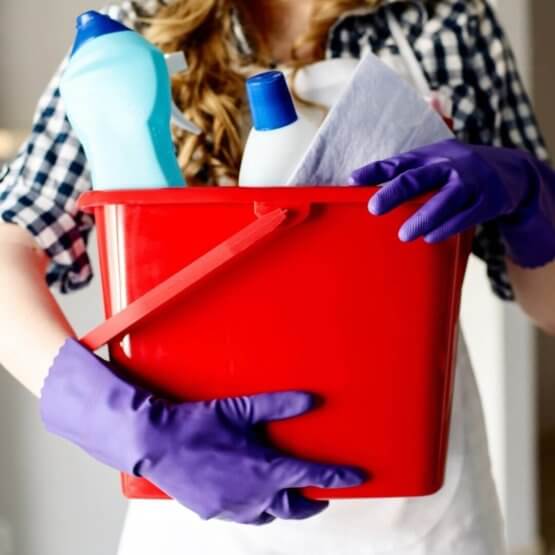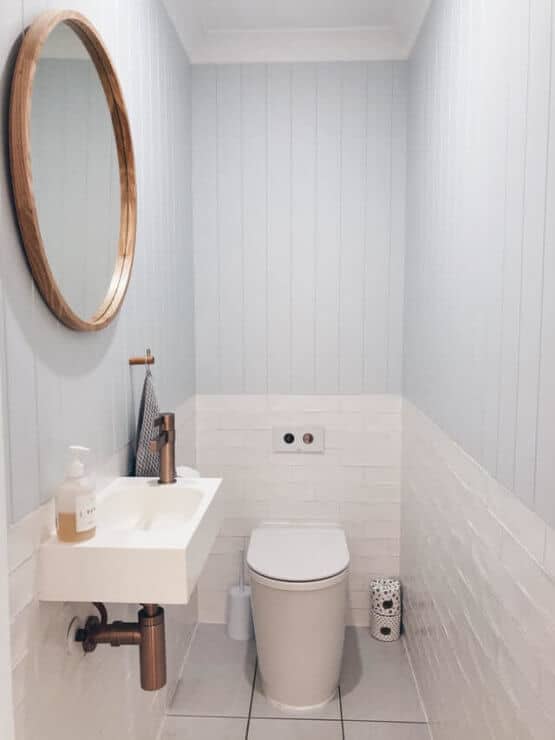Drainage problems can be really annoying and sometimes costly to resolve. To avoid possible clogs in drains, you should know how to maintain the drainage system through regular cleaning. To make such maintenance easier, it is crucial to understand what drain cleaner is, what it is made of, and how to use it. This might make you wonder, “is drain cleaner an acid or a base?” By understanding a little about drain cleaners, you can confidently choose the one that will resolve your drainage issue.
Short Answer To Is Drain Cleaner An Acid Or Base?
Acids are sour, corrosive substances that neutralize bases. [1] If a base gets in touch with an acid, it will react and produce salts. When choosing a drain cleaner, some often ask, “is drain cleaner an acid or base?” In general, drain cleaners can be of any kind, from strong acid to a strong base. The effectiveness of these products vary, but they work similarly.
What Are Drain Cleaners?

Drain cleaners are chemical substances used to clean sinks, drains, sewer pipes, and plumbing fixtures. The varieties of cleaners on the market differ because of the ingredient they are made of. Some are acids, and some are bases, each with its advantages and disadvantages. The pH level in each drain cleaner will determine whether the drain cleaner is an acid or a base.
Understanding The pH Level In Drain Cleaners
By looking at the drain cleaner’s pH level, you can determine how acidic or basic the specific drain cleaner is. The pH level of any substance refers to the “potential of hydrogen” or “power of hydrogen.”
The scale of pH levels ranges between 0 – 14, of which anything below 7 indicates acidic properties. Level 0 is the most acidic, and anything higher than 7 is more basic. The neutral point on a pH scale is 7. [2]
How Are Drain Cleaners Categorized?
There are two types of categories under which drain cleaners can fall, including Enzymatic and Chemical.
Enzymatic
Drain cleners that fall under Enzymatic usually consist of some bacteria or concentrated enzymes.[3] These bacteria or enzymes help to degrade the organic waste and keep the drain clean. They are considered safe to use and eco-friendly as well.
However, enzymatic drain cleaners are slow, and they will not solve the clog permanently. Therefore it is best to use these types of drain cleaners as a maintenance substance. They can help you keep the drain clean to avoid clogging..
Chemical
Chemical drain cleaners have some subsections of their own. [4] These drain cleaners are usually fast and effective and a good choice for unclogging drains completely. However, the downfall is that they are dangerous. They can produce harmful fumes, burn the skin, and damage pipes.
Chemical drain cleaners can consist of the following:
- acids like hydrochloric acid and sulfuric acid
- oxidizers like sodium hypochlorite
- caustics such as lye, caustic soda, or sodium hydroxide.
Is Drain Cleaner An Acid Or A Base? What Is the Difference?

A drain cleaner that contains strong acids is considered an acid drain cleaner. In these drain cleaners, the active ingredient is acid. A base drain cleaner, on the other hand, will have active base ingredients such as lye. Drain cleaners that are considered as a base may also contain potassium hydroxide (KOH).
Before, drain cleaners were mostly made acidic. While acid drain cleaners can still be found on the market today, base drain cleaners have become popular as well. If you don’t want to be wondering, “is drain cleaner an acid, or a base, then it’s best to understand the components of each one. Additionally, you will also know which one is the right one to choose for the cleaning job ahead.
Acid Drain Cleaners
Acid drain cleaners have a low pH level. This is because their active ingredient is sulfuric acid or Hydrochloric acid. These types of acids are strong enough to dissolve stubborn drain clogs. They can dissolve grease and hair as well as tissue paper inside the pipes.
Acid drain cleaners that contain sulfuric acid should be handled with caution. These types of drain cleaner can irritate your lungs if you inhale the fumes. Skin irritation can also develop if you touch the liquid.
This powerful acidity may also do damage to your pipes. They can also wear away at protective coatings and sealants, which can lead to leaks.
Basic Drain Cleaners
Base drain cleaners are also known as alkaline drain cleaners or openers. Most of them contain sodium hydroxide (lye), while others may contain potassium hydroxide. Base drain cleaners can be solid or liquid. These drain cleaners can score up to 14 on the 14 point pH scale. Such drain cleaners are even more basic than bleach, which means they are much more dangerous.
Some basic drain cleaners work by re-oxidizing to release hydrogen gas. The extra heat release then helps break down the greases, oil, etc., that formed the clog. These cleaners also generate hydroxide ions and are also able to dissolve hair, as hair contains proteins.
Basic drain cleaners are powerful. However, some are only really effective if applied directly to a clog. If applied to a clog, they will eat away at the clog’s fats, food, or other materials. If you have a toilet clog, it won’t be possible to apply this solution to the clog. This can make matters worse as it will loosen materials stuck to the side of the pipes, and they will eventually flow down to make the clog worse.
If, on the other hand, the base cleaner is a liquid formulation of corrosive alkaline, the liquid will sink to where the clog is. It will be able to reach the clog where oxidation will take place. It will turn grease into a soap-like matter by releasing gas and producing heat. This soap substance will dissolve easily later on.
Basic drain cleaners can also irritate the skin, and cause dangerous fumes when combined with other household products. The heat that is generated during the unclogging process can damage PVC pipes. Leaks are often needed in households that rely on liquid drain cleaners.
What Are The Best Acids For Cleaning Plumbing Pipes

Both types of chemical drain cleaners, acidic and base, works well for unblocking clogs. However, acidic cleaners can also help you remove mineral deposits, rust stains, or discoloration. So if you are trying to clean your pipes and are considering using an acid drain cleaner, here are some excellent choices!
Liquid Fire Drain Line Opener
The key ingredient in Liquid Fire Drain Line Opener is sulfuric acid. It is excellent in clearing clogs in sinks and toilets.
It is potent and easy to use as all you need to do is pour one to two cups of cleaner into the drain and wait 15 minutes. Afterward, you will have to flush for five minutes with cold water.
This drain cleaner is excellent for pipe cleaning as it will not damage plastic and acid-resistant metal pipes like copper. Keep in mind that this drain cleaner should not be used in tubs or showers. These drain cleaners are also not recommended if you have corrosion-prone metal pipes like aluminum or galvanized steel.
Roebic K-97-Q-4 Mainline Cleaner
For stubborn blockages, Roebic K-97 is a powerful acid solution. It can be used for clogs in toilets, septic tanks, and sewage systems. It will correct the slow flow in the pipes as it digests fats and grease in the main lines.
Roebic K-97 is a user-friendly product that is very effective for septic tanks. The downside to this drain cleaner is that it might have a very long-acting time.
Liquid Lightning Drain Opener
This is a buffered sulfuric acid solution that can clean scale dissolve pipe clogs and. To use the Liquid Lightning Drain Opener, you need to pour 12 – 16 ounces slowly into the drain. After 15 minutes, you rinse or flush (if in the toilet) the solution three times.
This drain cleaner is widely available and safe to use for cast iron or galvanized steel pipes. However, it is best not to use it if your home has an older plumbing system.
Zep Sulfuric Acid Drain Cleaner
Zep Sulfuric Acid is a powerful solution, so it should be handled with caution. However, it provides almost instant results if you have clogs in the pipes.
It can dissolve grease, fats, oil, protein, paper, and hair. It provides professional strength to clean toilets, sinks and drains. It will also clean toilet bowl stains effectively. This drain cleaner should not be used on garbage disposals, and you should make sure to read the safety instructions.
Betterbilt Chemicals Kleen-Out Sulfuric Acid Drain Opener
Betterbilt Chemical Kleen provides very clear instruction on how it should be used. About a ¾ cup should be poured directly into the drain and left to sit for 5 minutes. Flushing or pouring of water is recommended afterward, and you can repeat the process if needed.
Even though the solution itself does not have a foul odor, make sure to open the windows once used. This drain cleaner is very effective on stubborn clogs, but precaution should be taken when used.
Final Thought On: Is Drain Cleaner An Acid Or A Base
As we discussed, drain cleaners can be either an acid or a base. Both of these types of cleaners are effective in removing stubborn clogs in pipes. However, if you choose to go with a chemical solution, you need to be careful during the cleaning process.
Acidic and basic drain cleaners are both dangerous to use, and therefore instructions should be read carefully. Mixing products like these are never a good idea as they can cause hazardous gasses and even explosions. Therefore it is important to know which drain cleaner is acidic and basic to avoid mixing products.
Non-chemical drain cleaners and home remedies might be eco-friendly and harmless, but they are mainly used to prevent clogs from occurring. If you have a stubborn clog in your pipes and find that even chemicals are not working, it might be time to call the plumber.

Michael Davis is a heating & plumbing expert who currently works as independent contractor in SC. He also writes for Plumbertip.
For almost 10 years he worked on various plumbing tasks across South Carolina.



